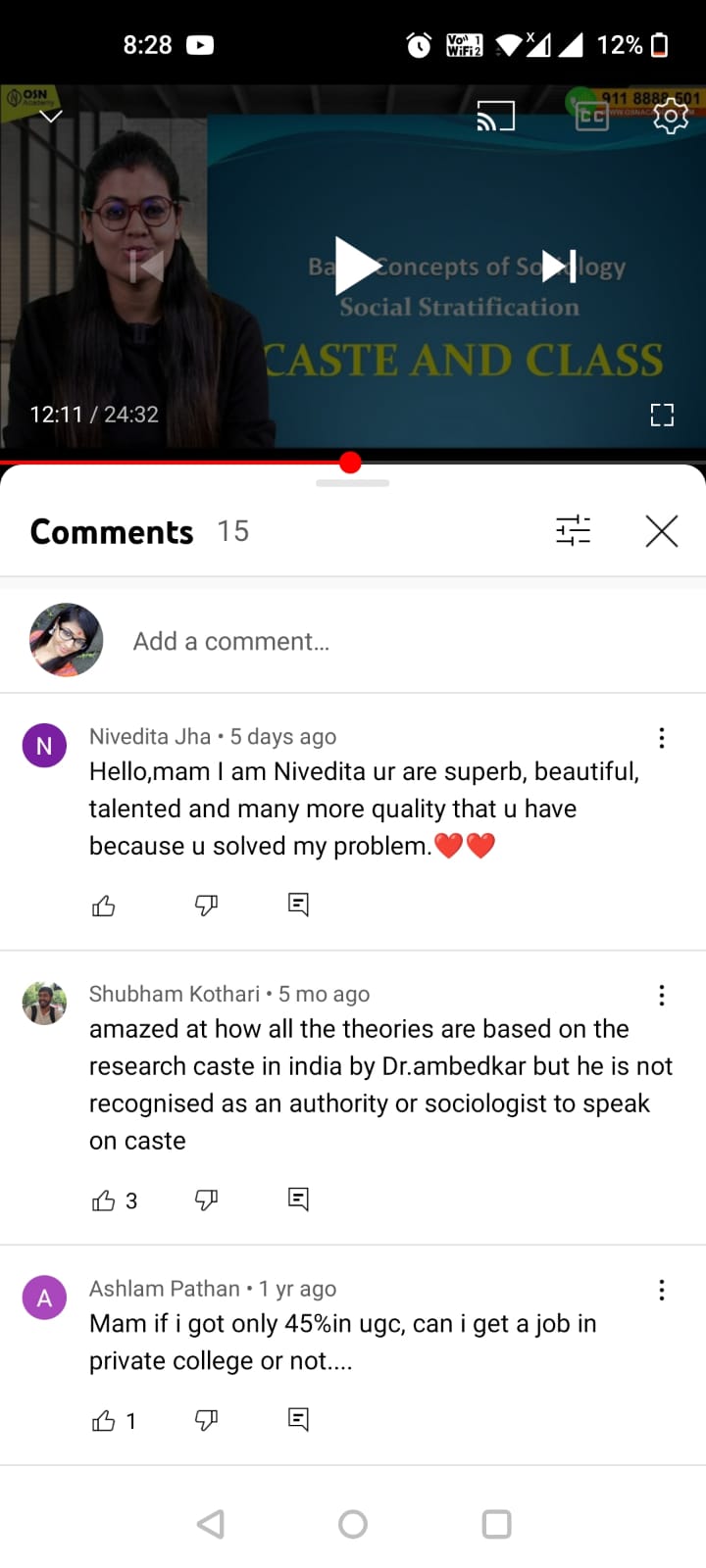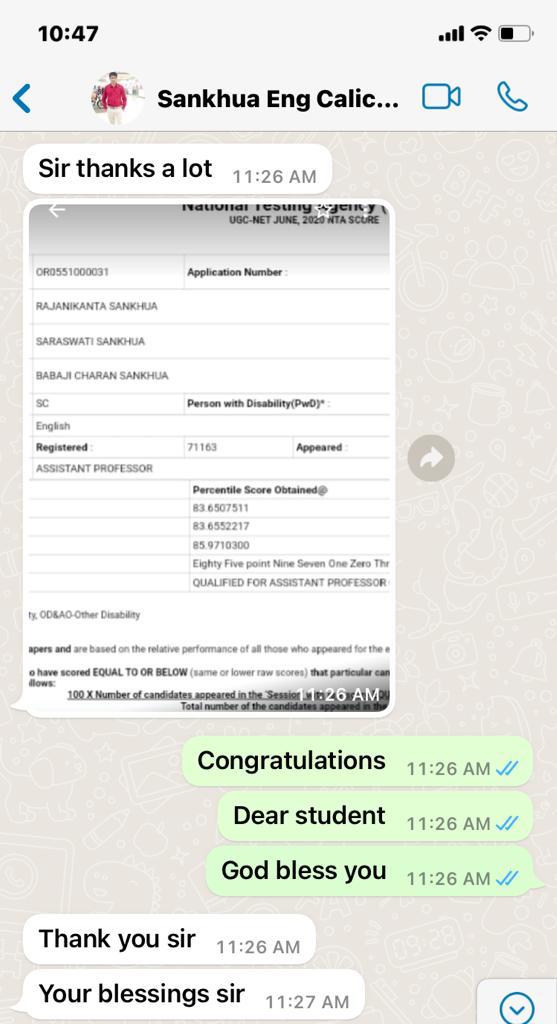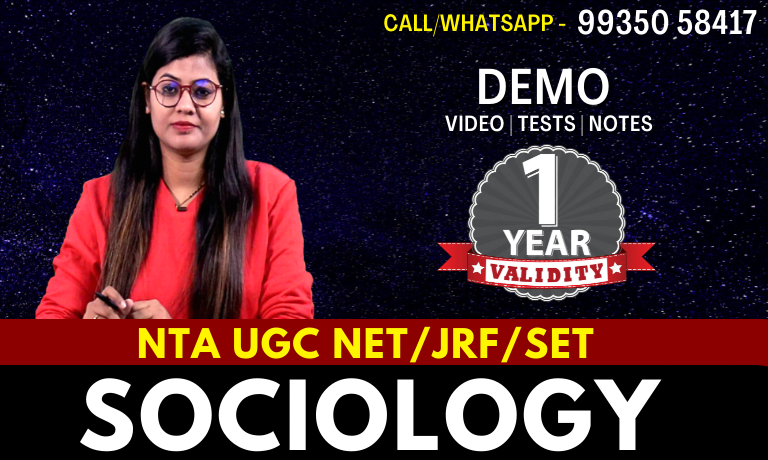4.8
ratings
NTA UGC NET incorporates and exhibits India's BEST UGC NET PAPER II- Sociology Video Classes + Test Series + Study Material. One can visualize up to 1000+ questions in All Online Video Classes covering all salient and foremost topics and questionnaires of UGC NET.
In this UGC NET/JRF Course, You Will Get:-
- Unit 1 to Unit 10 - Complete Online Video Classes According to Syllabus
- Notes/PDFs Available on OSN Academy App
- Course Validity - 6 + 6 Months Free = 1 Year
- Teach by English Literature Professor & NET JRF Ph.D. MBA Qualified Faculties | 20+ Years Experience
- Get Free Previous Years Paper
- Get Free Rs 999/- Test Series - (1000+ Multi Choice Question)
- View on Desktop - www.class.osnacademy.com
- Offline Videos Download Option
- Compatible for MOBILE (iOS & Android), TABLET, DESKTOP & LAPTOP
- All the Key topics covered in the videos
- Direct Connect to Sir
- PSS (Problem Solving Sessions)
- Career Guidance
- Best Technolgy use in OSN App for Smooth Video Streaming
- Videos are Easy to understand, Hassle-free retaining the collaborative mode in videos to enhance the preparation.
- Time saver
Size of Photograph -- 10 kb to 200 kb
Size of Signature -- 4 kb to 30 kb
Candidate must have
General/EWS - 55%, ST/ SC/ OBC/ PWD/ Transgender/ Ph.D Holders - 50% in Master’s Degree or Equivalent Degree
JRF - 31 years, Assistant Professor - No Upper Age Limit
NET/SET/SLET shall remain the minimum UGC NET eligibility criteria for the recruitment and appointment of Assistant Professors in Universities/Colleges/Institutions.
- UGC regulations and amendments, as notified under the Gazette of India will determine the exemption from NET/SET/SLET.
Note: Candidates who cleared the UGC/CSIR JRF examination before 1989 are also exempted from appearing in NET.
For SET Candidates:
- Candidates who have qualified States Eligibility Test (SET) which is accredited by UGC for Assistant Professor that was held before 1st June 2002, are also exempted from appearing in NET, and they are also eligible to apply for Assistant Professor. (anywhere in India).
- For SET held from 1st June 2002 onwards, the qualified candidates are eligible to apply for the post of Assistant Professor only in the universities/colleges from where they have cleared their state exams.
NO, Candidates need to have a master's degree to fill out the online application for NTA UGC NET
No restriction - Candidates can appear as many times as they wish till they are overage for JRF and for an assistant professor you can appear as many times as your wish
How to get Sample Online Video Classes ?
Go to the End of the Page Checkout
Course Currilcum
- Demo | Click on Video Title
UGC NET Sociology Syllabus for Paper-II
Unit 1. Sociological Theory
Classical Sociological Traditions
- Emile Durkheim
- Max Weber
- Karl Marx
Structure- Functionalism and Structuralism
- Bronislaw Malinowski
- A.R. Radcliffe- Brown
- Talcott Parsons
- Robert K. Merton
- Claude Levi Strauss
Hermeneutic and Interpretative Traditions
- G.H. Mead
- Karl Manheim
- Alfred Schutz
- Harold Garfinkel
- Erving Goffman
- Clifford Geertz
Post Modernism, Post Structuralism and Post Colonialism
- Edward Said
- Pierre Bourdieu
- Michel Foucault
- Jurgen Habermas
- Anthony Giddens
- Manuel Castells
Indian Thinkers
- M.K. Gandhi B.R. Ambedkar Radha Kamal Mukherjee
- G. S. Ghurye
- M.N. Srinivas
- Irawati Karve
Unit - 2 : Research Methodology and Methods
Conceptualizing Social Reality
- Philosophy of Science
- Scientific Method and Epistemology in Social Science
- Hermeneutic Traditions
- Objectivity and Reflexivity in Social Science
- Ethics and Politics
Formulating Research Design
- Reading Social Science Research, Data and Documents
- Induction and Deduction
- Fact, Concept and Theory
- Hypotheses, Research Questions, Objectives
Quantitative and Qualitative Methods
- Ethnography
- Survey Method
- Historical Method
- Comparative Method
Techniques
- Sampling
- Questionnaire and Schedule
- Statistical Analysis
- Observation, Interview and Case Study
- Interpretation, Data Analysis and Report Writing
Unit -3: Basic Concepts and Institutions
Sociological Concepts
- Social Structure
- Culture
- Network
- Status and Role
- Identity
- Community
- Diaspora
- Values, Norms and Rules
- Personhood, Habitus and Agency
- Bureaucracy, Power and Authority
Social Institutions
- Marriage, Family and Kinship
- Economy
- Polity
- Religion
- Education
- Law and Customs
Social Stratification
- Social Difference, Hierarchy, Inequality and Marginalization
- Caste and Class
- Gender, Sexuality and Disability
- Race, Tribe and Ethnicity
Social Change and Processes
- Evolution and Diffusion
- Modernization and Development
- Social Transformations and Globalization
- Social Mobility
Unit – 4 : Rural and Urban Transformations
Rural and Peasant Society
- Caste-Tribe Settlements
- Agrarian Social Structure and Emergent Class Relations
- Land Ownership and Agrarian Relations
- The decline of Agrarian Economy, De-Peasantization and Migration
- Agrarian Unrest and Peasant Movements
- Changing Inter-Community Relations and Violence
Urban Society
- Urbanism, Urbanity and Urbanization
- Towns, Cities and Mega-Cities
- Industry, Service and Business
- Neighborhood, Slums and Ethnic Enclaves
- Middle Class and Gated Communities
- Urban Movements and Violence
Unit – 5 : State, Politics and Development
Political Processes in India
- Tribe, Nation-State and Border
- Bureaucracy
- Governance and Development
- Public Policy: Health, Education and Livelihoods
- Political Culture
- Grass-root Democracy
- Law and Society
- Gender and Development
- Corruption
- Role of International Development Organizations
Social Movements and Protests
- Political Factions, Pressure Groups
- Movements based on Caste, Ethnicity, Ideology, Gender, Disability, Religion and Region
- Civil Society and Citizenship
- NGOs, Activism and Leadership
- Reservations and Politic
Unit – 6 : Economy and Society
- Exchange, Gift , Capital, Labour and Market
- Mode of Production Debates
- Property and Property Relations
- State and Market: Welfarism and Neoliberalism
- Models of Economic Development
- Poverty and Exclusion
- Factory and Industry Systems
- Changing Nature of Labour Relations
- Gender and Labour Process
- Business and Family
- Digital Economy, E-Commerce
- Global Business and Corporates
- Tourism
- Consumption
Unit - 7: Environment and Society
- Social and Cultural Ecology: Diverse Forms
- Technological Change, Agriculture and Biodiversity
- Indigenous Knowledge Systems and Ethno-Medicine
- Gender and Environment
- Forest Policies, Adivasis and Exclusion
- Ecological Degradation and Migration
- Development, Displacement and Rehabilitation
- Water and Social Exclusion
- Disasters and Community Responses
- Environmental Pollution, Public Health and Disability
- Climate Change and International Policies
- Environmental Movements
Unit - 8: Family, Marriage and Kinship
- Theoretical Approaches: Structure-Functionalist, Alliance and Cultural
- Gender Relations and Power Dynamics
- Inheritance, Succession and Authority
- Gender, Sexuality and Reproduction
- Children, Youth and Elderly
- Emotions and Family
- Emergent Forms of Family
- Changing Marriage Practices
- Changing Care and Support Systems
- Family Laws
- Domestic Violence and Crime against Women
- Honour Killing
Unit - 9 : Science, Technology and Society
- History of Technological Development
- Changing notions of Time and Space
- Flows and Boundaries
- Virtual Community
- Media: Print and Electronic, Visual and Social Media
- E-Governance and Surveillance Society
- Technology and Emerging Political Processes
- State Policy, Digital Divide and Inclusion
- Technology and Changing Family Relations
- Technology and Changing Health Systems
- Food and Technology
- Cyber Crime
Unit - 10 : Culture and Symbolic Transformations
- Signs and Symbols
- Rituals, Beliefs and Practices
- Changing Material Culture
- Moral Economy
- Education: Formal and Informal
- Religious Organizations, Piety and Spirituality
- Commodification of Rituals
- Communalism and Secularism
- Cultural Identity and Mobilization
- Culture and Politics
- Gender, Body and Culture
- Art and Aesthetics
- Ethics and Morality
- Sports and Culture
- Pilgrimage and Religious Tourism
- Religion and Economy
- Culture and Environment
- New Religious Movements
Many More Selected Candidates check out full profile


OSN Academy App - Google Review 4.7

Students
Profile
Course Currilcum
-
- MCQ Sociology – UGC NET SET JRF Sociology FREE Unlimited
- UGC Net JRF Sociology – Socialisation | समाजीकरण FREE Unlimited
- UGC NET Sociology – Caste and Class | Social Stratification | Basic Concepts of Sociology | #ugcnet FREE Unlimited
- UGC NET Sociology 2022 – Feminism | UGC NET JRF 2022 – Sociology FREE Unlimited



